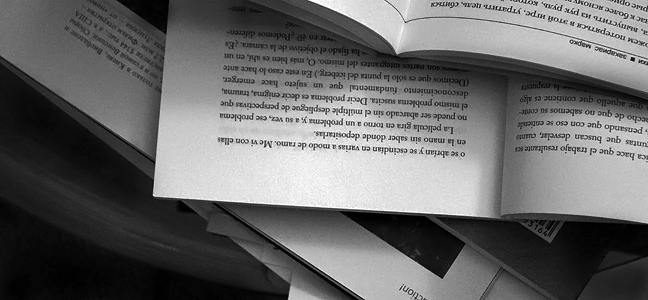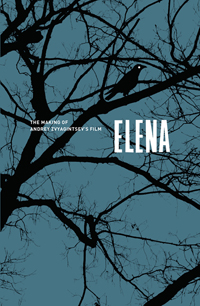|
INTRODUCTION. OLEG NEGIN
[...] Truthfulness is the only virtue which we can appreciate in the world of today. Purity, Self-denial and Compassion are on hold. All the intellectual veneer — morality, principles and dignity – are elusive, only recent acquisitions. In a situation of action pure and simple this fine varnish is instantly blown away – when "needs must", then our basic instinct (the search for gratification — dash — meaning), which has evolved over tens or hundreds of thousands of years of human existence, takes centre stage — as large as life, blocking out everybody and everything else. Genes, heredity...
THE CAMERA'S GAZE. MIKHAIL KRICHMAN
[...] A camera is something more than I the camera-man: it can see and do more than I can. I can study it and learn to understand its actual nature. A camera is a strange beast – slow, intelligent, precise and able to peer at a single point as if bewitched. You have to know not just how to attract its attention but how to steer that attention. If there is no reason to do so, it will not move, but simply look at what is in front of it. It might 'breathe' a little, 'help' a little, provide more air or, on the other hand, it might add pressure or tension — it has the ability... Yet it cannot move if not led somewhere by an actor, a flight of birds or the wind – by something... Mise en scène moves the camera. The outer 'texture' of the action in Elena is full of 'injections', 'incentives' and 'summons' to the camera.
[...] In Seryozha’s space though, movement is constantly being interrupted. Those two spaces are poles apart and the camera behaves in a fundamentally different way in each. [...] In the tight space of Seryozha’s flat we cannot just move smoothly on from one scene to another — only by a cut. This particular feature of the interaction between camera and space achieves an unusual visual effect: for instance when Tatyana goes out of the kitchen into another room where her husband and son are. Purely physical limitations make it impossible to follow her. This means that to move to where she is heading all we can do is switch everything off and then on again in a different place. Yet how can that be done while at the same time retaining a sense of movement? There is only one solution. Tatyana simply moves out of the frame, while we remain in the kitchen — in the frame which no longer contains her. After that we simply set up the camera in the room she was heading for, Seryozha’s bedroom, where he is sitting with his son – that is when she simply comes in to join us. In this way the camera is continually slowing things down. In the first instance letting a character move on while it lags behind and, in the second, waiting for the character to appear. This lingering camera lends a special syncopated rhythm to the whole space of Seryozha’s flat: movement then a pause, a jerk and then a pause. All the characters in it are engaging with each other and then trying to break away from each other. Relations between them are brittle, incoherent, chaotic and at the same time too close for comfort. In art, space is what characterises those who inhabit it: it is part of their portrait, a manifestation of their means of survival...
THREE INTERVIEWS. QUESTIONS TO THE DIRECTOR
This film is a thought about thinking, prompting us to look for answers. [...] As I see it that’s precisely the tradition we’re used to from Russian literature — questions being raised but not answered. Answers dispensed like that ‘free of charge’ have no value. Each of us needs to look for them himself. There are people who think the answer is clear: I would have done the same. That’s their responsibility, that’s how they find their "way-out". What is there to say? That’s the baggage they’ve brought with them to this point in their lives today and there’s nothing to be done about it unfortunately.
[...]Another question and a very subtle one, which I am still grappling with myself, is what to do about people who are aware of this situation but simply shut their eyes to it. I don’t know how to confront that. I don’t know what has to be woven together has to be created so that people should appreciate that, should grasp that this involves them, precisely them — not in such a way that they should derive satisfaction from such a realisation, but as a wake-up call to make them think about themselves in a completely different light. I don’t know. It’s a question I’m still working on. What is, however, perfectly clear to me is that what we don’t want to do is concoct sugary fairy-tales — all that sanctimonious treacle, cheap lemon sherbet which lull us into a sweet sleep about ourselves. We need to talk about the real issue, what is important, what is really happening and what you actually see, what makes you worry about what is happening to you and society... Those may sound highfaluting words, forgive me, but how else can you put it?
[...] A film always turns into something more than you originally planned and you can say that about it precisely because an image can unfold in the mind of the beholder and how it turns out will depend on whether it falls on fertile ground or not. If we think hard about something, select it and decide quite simply to go out and film it, it will not work at such a 'deep' level.
[...] I don’t regard myself as an adult even, for a long time I have been feeling like a child. At difficult moments, whatever choice has to be made. I measure myself up against one particular well-known character and understand straightaway what needs to be done. Everything becomes completely clear, but it is very difficult to take the next step, to find in oneself the courage to undertake the necessary action and follow it through. Perhaps that explanation sounds over-dramatic but that’s really how it is. I don’t have any other criterion, there’s no-one to prompt me as to what I should do and how. I’m not even talking here about words, which might inspire me to act. No. what matters is the figure, the taciturn figure. Reference has already been made to the Legend of the Grand Inquisitor today. So that’s it, His silence — Dostoevsky’s invention of pure genius.
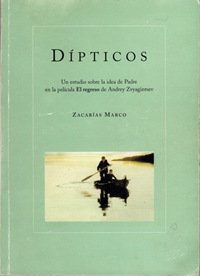
Zacarías Marco
DÍPTICOS
Madrid
2005
Un estudio sobre la idea de Padre en la pelicula EL REGRESO de Andrey Zvyagintsev.
Fragments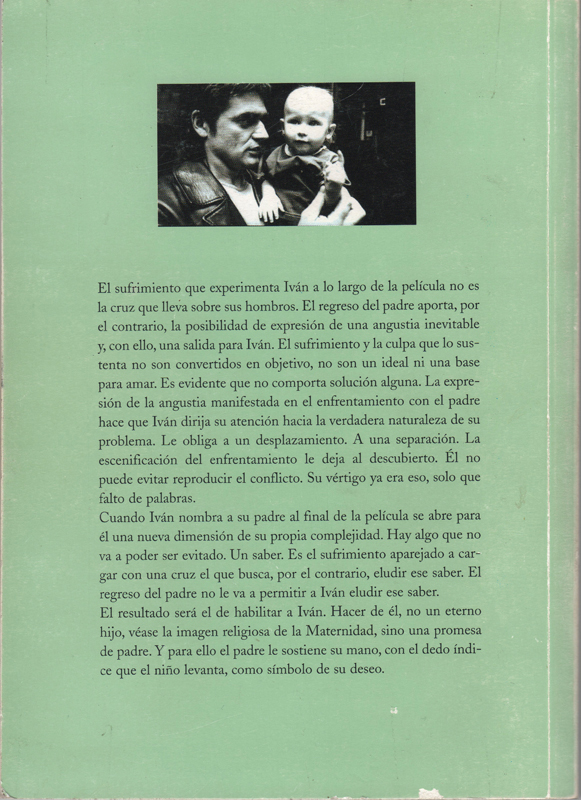
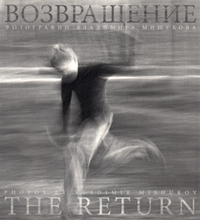
V.Mishukov
ВОЗВРАЩЕНИЕ. THE RETURN
Photo album
August Borg
2004"Returning is typical of the nature of photography itself. In front of you is my first album - it is an attampt to return to those days that will never repeat". /Vladimir Mishukov/
Where to buy• www.cygnnet.co.uk • www.amazon.co.uk
Foreword"As soon as the idea came of placing black-and-white photographs at the end of the film, I knew the name of the man who would make them. We’ve been friends for many years/ I love this man very mach for his sincerity, passion, huge talent and constant searching – not only in what they call creativity but primarily for his search to answer the major questions of life.
As for the pictures included in this album – I don’t think I should make any comments on them. I will only say that Volodya had to work in rather difficult conditions. He could take pictures during the pauses – while the light was being changed or before or after the actor’s rehearsals. It was hard to find the right angle or point from which the backstage of the shooting area was not visible. Such were the conditions – we didn’t have time to spare. The only time when he had all the shooting area at his disposal was when we had just finished the shooting in front of "Adrey and Ivan’s house". There was still enough light, and we managed to act out the scene of packing and leaving. The actors did it especially for Mishukov. He never had an opportunity like this again and so he had to seache for and scrape up the time and place to shoot. However, over the twenty-odd days he spent with the expedition, Volodya managed to make more than one thousand five hundred pictures. Of course, not all of them were included in the album, but all of them are the fruit of the patient, keen and observant eye of a talented man".
/Andrey Zvyagintsev/
